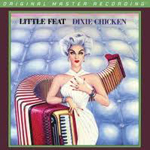Beck “Sea Change” Geffen Records / Mobile Fidelity Sound Labs
- Performance:

- Sound:


I think of good times and crazy innovations when I think of Beck Hansen’s music. He’s one of those folks that are so cool that they don’t need a last name. Most folks just call him “Beck.” I will too from this point on. Beck’s a creator and he sticks around, year after year, no matter what’s trendy and without a care in the world for what’s selling. At least, that’s how it seems to me. Maybe he just doesn’t pay attention to any of that, and his work would stand on its own in any era no matter what. There aren’t many of those folks around, and I’m glad I’ve borne witness to his artistic evolution. But that’s probably inaccurate. He doesn’t really seem to evolve as his work hasn’t progressed in any type of linear fashion. I mean that in the nicest way. He’s produced some pretty complex sounds with a lot of layers, but that doesn’t mean that his next album will necessarily be trickier than the last. And that’s what made “Sea Change” so shocking. He was well into his career when this one was released in 2002, but none of us had ever heard anything like this from him before. “Odelay” it is not, and that’s alright with me. (And “Odelay” is one of my favorites of all time.)
As I recall, “Sea Change” was born of the ruins of Beck’s relationship with his girlfriend of the time. You didn’t have to do much research to figure that one out. Beck certainly doesn’t sound like he was in a partying mood on “Sea Change,” and the lyrics are direct and raw. No funny euphemisms or samples. Instead, Beck goes for your guts with acoustic instrumentation and good old songwriting chops. He’s got ’em in spades. “Golden Age” would have garnered years of play in my house as a single. It seems even more significant when heard along with its “Sea Change” song family. I don’t want to suggest that the album is devoid of any experimentation or quirks. I can’t imagine Beck playing it entirely straight in any setting – heartbreak or no. But folks coming to “Sea Change” in search of a hip-hop hybrid sound will be left in a lurch. Of course, if they’re receptive to change or amenable to surprise, they won’t be left wanting. I’d known Beck to do “amazing,” but I don’t think I’d ever heard him do “beautiful.” At least, not in the traditional sense. Many of the songs on “Sea Change” are simply beautiful. I don’t know how else to say it. The dramatic orchestral synth swells in “Paper Tiger” give a fine counterbalance to the scattered electric guitar fills resulting in a lush sound that would rival Phil Spector’s finest work. “Guess I’m Doing Fine” almost sounds like a reprise of “Golden Age,” providing a bookend effect to one of the most perfect single album sides that I’m aware of. And it doesn’t end there. The acoustic piano in “Sunday Sun” couples his vocal melodies to spawn one of the more memorable ballads around. We all knew the guy could rap (sort of), but “Sea Change” shows us a singer that may have slipped through the cracks without these songs to showcase that ability. I hadn’t exactly studied his output to this point so it was a surprise to me, anyway. Some of the noisier passages hint at some anger beneath the hurt surface which I guess seems natural enough to anyone that’s endured this level of heartache. Evidently, it was extreme. My understanding is that he got the girl back in the end so all’s well that end’s well. Beck got the girl. We got the fruits of his despair. And we all lived to talk about it. Everybody wins.
Mobile Fidelity is responsible for this re-issue so the quality is unquestionable. The fun part is that I have the original to compare it to, and the MoFi release sounds better. Period. The original vinyl release followed the digital version by what seemed like an excruciatingly long time anyway. It seems like they could have done something like this from the start, but I’m not complaining. I can’t. I’m listening to the MoFi version now, and I’d have gladly waited for eight years if I’d known that I’d have a sound like this to greet me at the end. MoFi’s version places Beck’s voice a little deeper in the mix, and the levels are less “hot” as a general rule. There’s more warmth and nuance in the acoustic instruments than there were in the original too. I guess the master tapes aren’t so old that we have to worry about their degradation so it may have just come down to placing the project in more capable hands. Or hands with more money. Or luck. Whatever happened, it ended the right way. And we even got a bonus track out of the deal. This release is of the limited variety so don’t fall asleep with this one on your radar. If you’ve ever been curious about what Beck would sound like in the most flattering light available, go pick this one up. The results are moving. And not in the way that you’d expect.
Jamie Lidell “Compass” Warp Records Limited
- Performance:

- Sound:

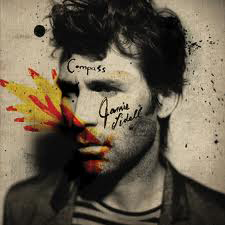
My reexamination of Beck’s “Sea Change” set me off on a tear that found me wasting countless hours exploring his website and generally searching for online information about what he’s been up to lately. There’s a lot of information out there and I must have gotten confused by the volume of it because I came away thinking that he’d produced Jamie Lidell’s most recent long player called “Compass.” I was wrong. He co-wrote and plays on some songs, but did not produce the album in its entirety. He’s listed in the credits under the heading “Additional Production.” As a fan, I hope that his contributions are not what resulted in my thinking that something was wrong with my stereo when I first took “Compass” for a spin. Seriously. I was honestly shocked and despondent to learn that one of my amps was blown or that my turntable had a bad connection or something in between. It turns out I was just making a mountain out of the proverbial mole hill. I’d simply purchased a record without having researched it, and it turned out bad. After testing my system to insure it was functioning properly, I began searching for things to like in the recording and making mental excuses for the artists involved. I succeeded in some areas. But this one’s not gonna make the cut. It’s going back. Digital download coupon and all. Sorry gang.
This was a shocker for me as Lidell pretty much had to snatch defeat from the jaws of victory to lose my support. I’d actually seen him open for Beck at the Fillmore a few years ago, and had followed him from a distance ever since. He builds his beats during live performances from the ground up using a keyboard, sampler, laptop, and the rest of it before singing over the production to complete the sound. His studio work was different. On the recordings I’d heard, it sounded like he was using a mostly live band to produce his retro soul sound. And it worked. He’s had a couple of tunes that found their way to me, mostly through my subscription to Paste Magazine which includes a CD sampler of the artists covered in each issue. I believe the one that really got me was called “Another Day” and he sounds a lot like Marvin Gaye on it. And I love Marvin Gaye. So do you. Who doesn’t? And I believe that track was from a release that directly proceeded “Compass.” So I had some history on my side as well as Beck’s implied endorsement. I couldn’t go wrong, and still can’t believe that I did. The gist of the issue is that Lidell’s use of dissonance and distortion is so pervasive that there’s nothing in the sound to compare it to so it just sounds… wrong. His voice, while remarkably versatile and impressively athletic, is often buried in the mix behind the deformed instrumentation. A couple of songs sound like they could catch your fancy in a different setting (“I Wanna Be Your Telephone”), but the setting never changes. Lidell obviously found the sound he was looking for because he stuck with it for the album’s duration. I just feel like there are better sounds to find. It’s like looking at what could be an interesting collage made of dull colors that all bleed together. On first listen, I hoped against all logic that the second side would involve an entirely different sound. It did not.
I’m not going to beleaguer this point any further. I am of the opinion that Jamie Lidell is a fine singer with tons of talent. He made a record called “Compass” that doesn’t do it for me. It’s a single record on lightweight vinyl that comes with a digital download coupon. You’ll be able to pick up a used copy with the coupon included at a local San Francisco retailer soon if you know where to look. I hope you like it. I’m sure lots of people will. Just like lots of people like to wear their pants around their knees. Not my thing…
The Drive-By Truckers “The Big To-Do” ATO
- Performance:

- Sound:

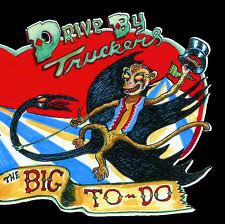
I’ve been a Drive-By Truckers fan for a long time in rock and roll years. I hopped on their band’s wagon while they were recording “Southern Rock Opera” which would find them a much larger and more rabid audience than the one they were playing to prior to it’s release. Some folks still consider it their watershed, but I’m not amongst them. I think that they’ve more or less gotten better with every release (save for one sequential misstep), and their business model is one that any up and coming band could learn from. These boys (and girl) do it the old fashioned way. They E. F. Hutton it. Out on the road, playing their show with the same energy and force whether they’re in front of three people or three thousand. They’ve gone from a band that relies on its humor and rock spirit to a band that will knock you dead with musicianship and song writing ability – and a healthy dose of humor and rock spirit. “The Big To-Do” is another in a long line of stellar albums that beautifully delineates their force as a live band and their ability to craft a fine long player with its many moods and nuances. One could make the comparison to a live play versus a movie. Stage shows require much larger gestures and movements to reach the back row while a movie relies more on subtleties and shading. “The Big To-Do” is full of subtlety and shading. And the vinyl package is like a concert festival on its own. An overwhelming stimulation of sight and sound. The best of both proverbial worlds. Hallelujah.
DBT have always employed at least two, often three, main songwriters so they’re constantly coming at you from a variety of perspectives and with a cavalcade of influences. That’s not to suggest that their sound is in any way watered down by attempts at genre jumping. Theirs is one of the more cohesive sounds available and the principles, Patterson Hood and Mike Cooley, go together like peanut butter and chocolate. Or whiskey and women. That’s more apt. Both are on top of their game now, but Patterson seems to have taken the lead on this one. His stamp is all over “The Big To-Do” while Shonna Tucker gifts us with a couple of choice compositions as well. Add their new keyboardist, Jay Gonzalez, to the mix (as a player, not a writer) and you’ve got quite a potent cocktail and one that will surprise some diehard DBT fans at first gulp. (They’re a thirsty lot, and they’re sticking around until the lights come up. Trust me.) I’d have called you crazy or worse if you’d told me that the Truckers would morph into a machine capable of churning out high sweet harmonies during their “Gangstabilly” days. Funny what time will do. That particular niche is displayed prominently on “After The Scene Dies” which I know they’ve had in their pocket for a couple of years because I’ve seen them play it live on a couple of occasions. They’ve got the right line up for a first-rate recording of it now, and they capitalized to the full extent of the rock law. They can still slay you with straight guitar power too as evidenced by “Daddy Learned To Fly” and “Drag The Lake Charlie” and a host of others. The harmonic additions and sonic delicacies only make that fact more apparent. “The Big To-Do,” with thirteen songs plus one bonus track for the vinyl version, is leaner than their last official release, and I think it’s a stronger offer as a result. There’s no need for a song-by-song dissertation here. They’re all brawny, no filler. If you like true rock and roll, you need a copy. On vinyl. Period. Amen. It comes with a CD anyway, if you’re still into that sort of thing.
I think you can tell how much a band cares about their fan base by the quality of their vinyl releases, and there’s nothing half-assed about “The Big To-Do.” We had to wait a while for it because the first pressing got botched while the digital version was widely available. I’m glad I waited. We’ve got a gatefold cover with larger-than-life Wes Freed artwork along with a state of the union from Patterson in the liners. Freed’s work is also featured on the records themselves and he has one panel for each song in the liners too. Both records are heavy and glossy. Mine have some markings and are not perfect which fits perfectly with the Truckers ethos. (I hope I don’t find myself on the business end of a DBT beat down for saying so. No, wait. I hope I do. That’d be one more for the book.) For my money, the Truckers are fighting with Hacienda for album of the year so far. If anything better comes along, I can’t wait to here it. Here’s to hope. And “The Big To-Do.”
JJ Cale “Naturally” A&M / Speakers Corner
- Performance:

- Sound:

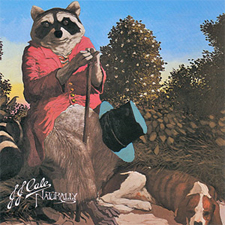
My dad came home with a compact laser disc player in the mid-’80’s and I thought it was something out of Star Trek. One of the first shiny discs with the rainbow colors in it that he owned was called “Grasshopper” by JJ Cale. He listened to it quite a bit because it was good and because it was probably one of the only options on the menu at the time. Cale had been at least a presence on the worldwide music scene since the very early ’70’s when Eric Clapton released his version of Cale’s “After Midnight,” and basically co-opted Cale’s entire sound on Clapton “originals” like “Lay Down Sally.” Lynyrd Skynyrd got in on the act too, with their cover of “Call Me The Breeze,” so that by 1976 most classic rock radio listeners were familiar with Cale’s work whether they knew it or not. JJ Cale, of course, has yet to attain the level of commercial appeal that has landed his followers in the Rock and Roll Hall of Fame. But he’s popular enough to warrant the re-issue of his stellar debut, “Naturally,” by Speakers Corner Records, and that’s good news for folks in the know about Tulsa’s own JJ Cale. I found plenty of surprises in these grooves, and I much prefer Cale’s style to that of his acolytes.
The first jolt comes early as the album opener, “Call Me The Breeze,” kicks things off with the unmistakable sound of a spartan drum machine. I mean, it’s like you’re listening to a rock and roll version of a Sly and the Family Stone record circa “There’s a Riot Goin’ On.” It would be redundant to mention that Cale’s version of the tune is more laid back than the wildly successful Skynyrd version. Cale’s music is tranquil to the same degree that the Gulf oil spill sucks. So much so that I didn’t recognize “Don’t Go To Strangers” on first listen as a song that I’d performed live with my former band in the early 2000’s. Our guitarist came to us with his idea for the cover, and we worked it up without most members ever having heard the original. And it showed. Such is the scope of Cale’s reach and influence. (That’s not to say that the man’s work is unimpeachable. Widespread Panic covered his “Travelin’ Light” on their debut album which meant that every hippie in the Southeastern United States had been given the green light to accept Cale’s work on the authority of their idols. As a result, I could listen to nothing but Cale’s “Travel Log” for a period of about six months while working in the kitchen of an Italian restaurant in Athens, Georgia. It wasn’t nearly as compelling as his earlier work, but I was the only person that seemed to notice.) “Naturally” did spawn one radio hit, “Crazy Mama,” and Cale’s take on his own “Cocaine” got some air time too. Clapton actually released his version first so the general populace probably thought that Cale’s was the cover. So it goes. “Keep your head down and your money in the bank.” That would have been my advice to the notoriously press-shy troubadour. And it sounds to me like the influencer’s influences might actually be traceable too. I hear Tony Joe White in songs like “Magnolia.” (Unfortunately, I hear Burt Bacharach’s “Walk On By” as performed by Dionne Warwick in that song too. That’s probably my fault more so than Cale’s.) Someone like Cale was needed in 1971, and “Naturally” probably served as a fine counterbalance to the increasingly self indulgent rock of the time. The pendulum had swung so far to the left that it had to come crashing back through to the right. Shuggie Otis was mining the same territory in the world of soul music, and I’m thankful to both artists for stalling the inevitable as both genres have evolved into something unrecognizable by now. There’s not much of a market for subtlety these days, folks. You’re going to have to dig below the surface of what’s popular to find any. And the rewards will be few.
But listening to Speakers Corner’s re-issue of “Naturally” is quite rewarding. There’s nothing flashy about the packaging and the release doesn’t include any extras (no digital copy, for instance), but the sound is quite impressive. I haven’t priced any originals for comparison, but I think you’d be hard pressed to find a more perfect copy from any era. Mine’s flawless. The instrumentation and performances are so sparse that any crackle or hiss would surely be noticeable during playback and mine just doesn’t have any of that. “Naturally” harkens back to a day when albums were about 35 to 40 minutes long on average (that’s an estimate, not a hard fact), and this makes for a perfect quick listen when you’re in the mood for some rock without the bombast that was more indicative of the day. Pick one up and see what Clapton, Knopfler, Neil Young and the gang have known for years. JJ Cale’s the real deal, and his first album’s a fine introduction to his work.
Big Boi “Sir Lucious Left Foot… The Son of Chico Shorty” Def Jam
- Performance:

- Sound:

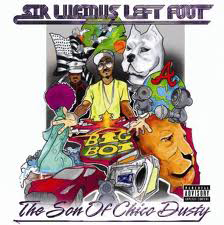
I saw a giant window display in a New York City chain store window in October of 2000 that made me believe that Outkast was about to take over the music world. I don’t know what tipped me off, but I wasn’t wrong. It was a simple photo of Andre’ 3000 and Big Boi posing in front of a black and white American flag. It was the album artwork for their fourth album, “Stankonia.” I purchased a copy immediately, in advance of the official release. I don’t know why it was available, and never figured it out. Basically, it was an all around mysterious experience. And I caught the fever along with everyone else. I bought the ticket, I took the ride, I saw the show (at the Fabulous Fox Theater in the group’s hometown of Atlanta, no less). They followed up that success with the even gaudier “Speakerboxxx/Love Below” which cemented their reputation as this globe’s premier hip-hop act. Then, they disappeared. Their next, and to this date last, official release seemed to come and go without much fanfare at all. Such is the “here today, forgotten tomorrow” existence of the rap game. If you’re not new, you’re through. Big Boi just released his first solo album, “Sir Lucious Left Foot… The Son of Chico Dusty,” and he has served notice to all: he ain’t through.
It’s worth mentioning, right off the bat, that Big Boi’s artistic landscape involves extreme adult subject matter. It is all rough language and rampant sexism. Glorification of violence and drug abuse (if you count marijuana as a drug). To me, it’s like listening to a musical version of “Scarface.” It’s funny as hell, and rocks like crazy. It could be scary and offensive taken outside of that context so I prefer to listen to it as a comedic piece similar to the Richard Pryor albums that I used to listen to from my dad’s collection when my folks weren’t around. (“Yeah, and it’s deep too.”) Lyrically, it’s all that you’d expect from one of the master MC’s of the day. Big Boi’s delivery is smooth as butter, and his musical tracks are totally new with the strongest roots. All of the influences are there: Parliament/Funkadelic mostly (George Clinton guests on one track) with plenty of Prince too. Completely classic with a nod to the future. That’s how he’s stayed in the game all these years. I assumed that Andre’ 3000 was the creative lead in Outkast, pushing the envelope and evolving their sound in ever-expanding ways. Now, it seems obvious that Big Boi was full of ideas too. He’s the finest type of innovator, and amongst the absolute best at what he does. And what he does is rhyme words and say them quickly. Funny words. Most of them not fit for print in this arena. And he’s comfortable enough in his skin, even with his gangster image, to compare himself to Greg Louganis who is openly gay. I had apprehensions when I saw all of the “featuring” credits on the album cover. I’m a little burnt with all of the collaborations that are so prevalent, especially in hip-hop, these days. Sometimes it seems like no one can make an album on their own. But all of Big Boi’s cohorts actually serve his songs with meaningful contributions – none more so than Janelle Monae on “Be Still.” She basically takes over that one, and the results are over the top. “Tangerine” is my current fave on the record, but the work is deep, and I suspect that every song will have been my favorite at some point eventually.
The vinyl presentation is just okay. The two discs are pressed on white vinyl in a single outer cover which will eventually split without a gatefold. No download code or CD included, and both of my records are slightly warped. Having said that, they sound fine. The bass, obviously, is prevalent and will rattle windows for miles. But it doesn’t overwhelm the vocals, and that’s where the money is. I’d say if you’re a fan of hip-hop, classic or new, that you should add this one to your collection. If you’re not a hip-hop fan, you probably won’t find as much cross-over appeal as you get with his work in Outkast. I’m on board with this one, and I hope to catch his tour in support of it assuming there will be one. I probably won’t buy the special edition Converse Chuck Taylors that are tied in with the release. But I might.


